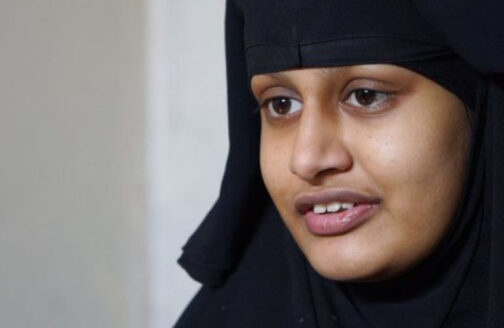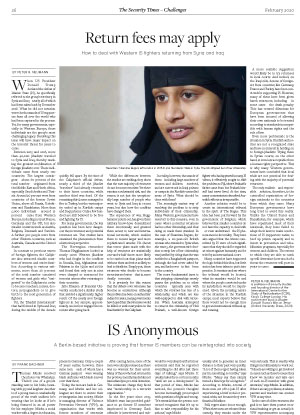How to deal with returning IS fighters

When US President Donald Trump declared the defeat of Islamic State (IS), he specifically referred to the group’s territory in Syria and Iraq – nearly all of which had been taken back by December 2018. What he did not mention were the thousands of IS supporters from all over the world who had been captured in the process. Yet, for many governments, especially in Western Europe, these individuals are the group’s most challenging legacy. Resolving this issue will have major impact on the terrorist threat for years to come.
Between 2013 and 2016, more than 40,000 jihadists traveled to Syria and Iraq, thereby marking the greatest mobilization of foreign jihadists ever. These individuals came from nearly 100 countries. The largest contingent – about 60 percent of the total number – originated from the Middle East and North Africa, especially Saudi Arabia and Tunisia. Around 20 percent were from countries of the former Soviet Union, above all Russia, Uzbekistan and Kazakhstan. More than 5,000 individuals – around 12 percent – came from Western Europe, including not just France, Germany and the UK, but also smaller countries such as Austria, Belgium, Denmark and Sweden. A further 500 people were from other Western countries, such as Australia, Canada and the United States.
In contrast to previous waves of foreign fighters, the Caliphate also attracted sizable numbers of women and entire families. According to various estimates, more than 20 percent of the total number consisted of women and girls who “emigrated” to the Caliphate in order to become teachers, nurses, doctors, propagandists or to give birth to the next generation of fighters.
Yet, the “jihadist international” that had formed in Syria and Iraq during the middle of the decade quickly fell apart. By the time of the Caliphate’s official defeat, nearly a third of the jihadist “travelers” had already returned to their home countries, while another third was dead. Of the remaining third, some managed to flee to Turkey, but the vast majority ended up in Kurdish camps and Iraqi prisons. Only a few hundred are still believed to be free and fighting for IS.
For many governments, the key question has been how dangerous those returnees and potential returnees are. Two studies have examined the phenomenon from a historical perspective.
The Norwegian researcher Thomas Hegghammer looked at nearly 1,000 Western jihadists who had fought in the conflicts in Somalia, Iraq, Afghanistan and Pakistan in the 1990s and 2000s and found that only one in nine were charged or sentenced for terrorist crimes after returning to their countries.
Jytte Klausen of Brandeis University conducted a similar study that yielded a significantly higher result. Of the nearly 900 foreign fighters in her sample, approximately one in four engaged in terrorism after going back.
While the differences between the studies are striking, they show that the vast majority of returnees do not become terrorists. Yet there remains a substantial risk, and the reason is not just the exceptionally large number of people who went to Syria and Iraq in recent years, but also how the conflicts have changed them.
The experience of war, Hegghammer points out, has given them military know-how, desensitized them emotionally and granted them access to new and international networks, which enables them to mount larger and more sophisticated attacks. He shows that terror plans made with the help of returnees are statistically one-and-a-half times more likely to be carried out than plans made without them and twice as likely to lead to fatalities. Simply put, those returnees who decide to become terrorists are better – that is, more deadly – terrorists.
It is precisely for this reason that the debate over returnees has become so contentious. Although the problem has been on authorities’ radars for years, many governments have hoped that the returnees would be killed or seek martyrdom in the final battle for the Caliphate.
In reality, however, thousands of them – including large numbers of women and children – survived, and are now stuck in Iraqi prisons or camps in the Kurdish-controlled areas of Syria. What should be done with them?
The seemingly easiest way of resolving the problem is to strip individuals of their citizenship. Many Western governments have resorted to this measure, even in cases where potential returnees had no other citizenship, and thus doing so made them stateless. In the case of Shamima Begum, for example, a 20-year-old British woman who traveled to Syria when she was 15, the government’s decision to strip her of her citizenship was justified by citing that she was entitled to a Bangladeshi passport, although she had never asked for one, and had never – in fact – been to the country.
The more fundamental issue is that stripping citizenships merely passes the problem on to other countries – typically ones with which the returnee has less of a relationship and which are less well-equipped to deal with terrorists. When Australia attempted to remove the citizenship of Neil Prakash, a well-known foreign fighter who had appeared in many IS videos, it effectively sought to shift the problem to Fiji, where Prakash’s father came from but Prakash himself had never lived. At the time, many commentators described Australia’s efforts as irresponsible.
Another solution would be to create an international tribunal in the spirit of The Hague. This idea has been put forward by the government of Belgium, which believes that smaller countries do not have the capacity to deal with – or even understand – the IS phenomenon in its totality. They have also argued that the crimes committed by IS were of such significance that they should be regarded as crimes against humanity and be tried by an international court.
Many countries have supported the logic behind this idea, but little action has been taken to put it into practice. It remains unclear where the tribunal would be located, what its mandate would be and where the people convicted under its jurisdiction would be imprisoned. Given the pressing nature of the situation in the Kurdish camps, most experts believe that there would not be enough time to get an international tribunal up and running.
A more realistic suggestion would likely be to try returnees in local courts. And indeed, on the Iraqi side, dozens of foreigners from countries like Germany, France and Turkey have been convicted for supporting IS. However, many of them have been given harsh sentences, including – in some cases – the death penalty. This has created dilemmas for European governments that have been accused of allowing their own nationals to be treated according to standards incompatible with human rights and the rule of law.
Even more problematic is the situation in Syria. Kurdish authorities are not a recognized state and have no interest in holding on to foreign jihadists. Trying them in Syrian courts, on the other hand, is even less acceptable from a human rights perspective. This is why many Western governments have concluded that local trials are not practical for dealing with the majority of potential returnees.
The only realistic – and responsible – solution, therefore, is the controlled repatriation of foreign nationals to the countries from which they came. Many European governments have long tried to avoid this reality. Unlike the United States and Kazakhstan, for example, which have repatriated most of their nationals, they have failed to adapt their laws to make convictions of IS supporters easier, to beef up prison capacity and to invest in prevention and rehabilitation programs, especially for women and children. The extent to which they are able to catch up will determine how much of a threat the returnees will pose in years to come.
PETER R. NEUMANN
is professor of security studies and founding director of the International Centre for the Study of Radicalisation (ICSR), King’s College London. His most recent book is Bluster: Donald Trump’s War on Terror (Oxford University Press, 2020).




